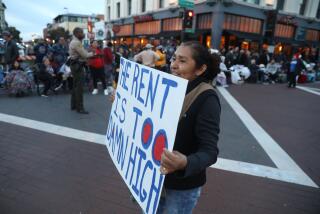What to do with Fannie and Freddie?
What’s the right role and structure for Fannie Mae and Freddie Mac? How about the Federal Housing Administration? Previously, Abromowitz and Mitchell discussed John McCain’s proposal for the government to buy bad mortgages, the biggest players in the mortgage meltdown and whether Washington should give tax breaks to homeowners.
The Fannie-Freddie system has worked for decades
Point: David M. Abromowitz
Dan,
Fannie Mae and Freddie Mac became semi-nationalized after nearly one in 10 borrowers entered default, producing a broad political consensus that these government-sponsored enterprises remain essential in keeping the home mortgage market functioning. But a momentary point of agreement between conservatives and progressives -- albeit with critics from each end -- hardly portends consensus over what comes next. As Milton Friedman once famously declared, “Only a crisis, real or perceived, produces real change. When that crisis occurs, the actions that are taken depend on the ideas that are lying around.”
Many ideas about the government’s role in housing are lying around. As you noted before, though, we can’t prescribe a cure if we use the wrong diagnosis. You and other anti-government types object to the very idea of public assistance for housing. Then you attribute the subprime excesses that created today’s crisis to Fannie and Freddie without offering any evidence.
We get candidates like John McCain repeating the same inaccuracies: “The catalyst for this housing crisis was the Fannie and Freddie Mae (sic) that caused subprime lending situation that now caused the housing market in America to collapse.” Misleading diagnoses just divert attention to the wrong problem; so does blaming -- as you did, Dan -- without factual basis a 30-year-old effort to end the red-lining of low- to moderate-income communities through the Community Reinvestment Act.
The facts instead show that the private mortgage company pipeline into Wall Street upended our 70-year-old home finance system. Make no mistake: Fannie and Freddie executives misstated earnings and exerted too much influence over Washington (just as the managers of many purely private companies that failed miserably did). Their sins didn’t cause our housing woes, nor are they justification for evicting government from our mortgage finance system right when our housing situation is in a shambles.
Instead, in the short term we want stabilized Fannie and Freddie and take a page from the Federal Deposit Insurance Corp., which emphasizes mortgage restructuring rather than foreclosure to reduce losses and mitigate downward pressure on home values. This eases panic, slows the flood of homes for sale into a malfunctioning market and lets normal price mechanisms return without reinflating the bubble.
For the longer term, there are several possible models:
* Many conservatives are pushing to shrink Fannie and Freddie as a precursor to fully privatizing the secondary market for home mortgages.
* Some, generally on the liberal side, advocate returning Fannie and Freddie to full government ownership as the way best to carry out their original mission.
* Others across the spectrum have promoted a public utility model, which would retain private capital ownership and profit but in a constrained and regulated entity.
Debate over Fannie and Freddie needs to assess which model best maintains the desired function. Long-term fixed-rate mortgages and similar safe products have for decades enabled younger families and the middle class to buy homes with reasonable debt burdens. There is little evidence that a purely private system would make such products widely available. Would a fully privatized mortgage market incorporate protections needed at the origination stage to avoid high-cost and predatory loans? Would full privatization permit interest rates to spike on adjustable-rate mortgages?
As I noted Monday, across the country, we have decades of experience with effective programs that provide stable, affordable mortgages to low- and moderate-income borrowers. Those are the “ideas lying around” that need to be picked up and made widely available.
P.S., Dan: As to the role of the Community Reinvestment Act in our housing problems, despite the specifics I offered, you simply labeled it on Tuesday one of your three great culprits for our current ills. The facts debunk this claim. Any reader interested in learning the facts should click here.
David M. Abromowitz is a lawyer and a senior fellow at the Center for American Progress Action Fund.
Put a stake through the hearts of Fannie and Freddie
Counterpoint: Daniel J. Mitchell
I feel sorry for you, David. Defending Fannie and Freddie is rather akin to being the public relations flack for Robert Mugabe or Hugo Chavez.
Indeed, the one silver lining to the dark cloud in financial markets is that it is no longer tenable to credibly argue in favor of government-sponsored enterprises such as Fannie and Freddie. These corrupt entities played a significant role in causing the real-estate bubble, and politicians -- if they had any sense -- should liquidate Fannie and Freddie now that they are officially insolvent.
Let’s quickly review why Fannie and Freddie should have been shut down and also show how they contributed to the financial mess.
* Fannie and Freddie were explicitly designed to divert capital into residential real estate. The implicit (now explicit) government guarantee meant that interest rates for home mortgages were subsidized compared to rates for other forms of borrowing. This does not necessarily cause systemic risk, but it does harm long-run economic performance by soaking up funds that otherwise would have been used for business investment.
* Fannie and Freddie were perverse examples of crony capitalism. An important feature of a genuine free market is that everybody plays by the same rules. But the interest-rate subsidy available to Fannie and Freddie gave them a huge advantage over other companies. Ironically, much of that subsidy wound up lining the pockets of the political elite that somehow -- notwithstanding a total lack of real-world business acumen -- wound up getting top slots in the Fannie and Freddie hierarchy.
* Fannie and Freddie expanded their activities beginning in the 1990s, shifting from being akin to a subsidized investment bank that issued mortgage securities to being akin to a savings and loan institution on steroids. In effect, Freddie and Fannie became their own biggest customers, issuing debt to amass huge portfolios of securitized mortgages. This destabilized the entire financial system by contributing to the housing bubble. A few policymakers tried to rein in the worst excesses, but they were blocked by politicians such as Rep. Barney Frank and Sen. Chris Dodd, all of whom were major recipients of campaign contributions from Fannie and Freddie.
* In 2000, Bill Clinton’s Department of Housing and Urban Development made a bad situation even worse by imposing so-called affordable-housing quotas on Fannie and Freddie. The government-sponsored enterprises responded by becoming huge purchasers of securities containing subprime mortgages. This further contributed to systemic instability and the housing bubble. The Bush administration added fuel to the fire in 2004 by increasing the affordable-housing quotas, and Fannie and Freddie responded by lowering the standards for mortgages they would purchase for securitization.
There is a lot more that can be written about Fannie’s and Freddie’s mistakes and their corrupt symbiotic relationship with the political class, but there’s only so much that can be said given space limitations.
The key question is what should be done now that Fannie and Freddie are on life support. If there is any common sense in Washington, they will be shut down. The simplest approach, at least once the financial crisis has passed, is to cease and desist any new securitization (leave that function to real private-sector companies) and to pay off existing debt as the securities and mortgages in their portfolios mature.
Daniel J. Mitchell is a senior fellow at the Cato Institute, where he is an expert on tax reform and supply-side tax policy.
More to Read
A cure for the common opinion
Get thought-provoking perspectives with our weekly newsletter.
You may occasionally receive promotional content from the Los Angeles Times.






